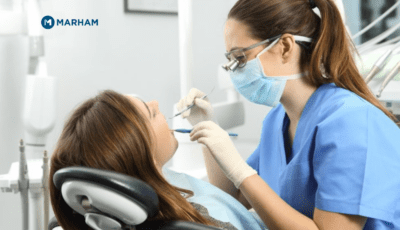Maintaining regular dental check-ups is crucial for preserving optimal oral health. Typically recommended every six months, these check-ups detect potential issues in their early stages and facilitate thorough cleanings to prevent concerns like cavities and gum disease.
When should you see a dentist?
It is recommended to consult a dentist for the following conditions;
Routine Check-ups (Every Six Months)
Schedule visits to the dentist for check-ups and cleanings at least twice a year. These appointments provide opportunities for early identification of issues like cavities, gum disease, and even oral cancer. Additionally, they facilitate the thorough removal of plaque, tartar, and stains that regular brushing and flossing might not address effectively.
Moreover, these regular visits allow for consistent monitoring of your overall oral health.
Dental Pain or Discomfort
You should visit your dentist if you experience persistent dental discomfort, temperature sensitivity, or ongoing toothaches. Such symptoms often signal problems such as cavities, infections, or gum diseases that demand professional attention.
Dental Emergencies
In case of dental emergencies such as a broken tooth, severe bleeding, or a dental abscess accompanied by pain and swelling, seeking immediate dental care is crucial. Many dental clinics allocate time for urgent cases, ensuring timely and appropriate treatment.
Observing Changes
Regularly inspect your mouth for any unusual changes. Talk to a dentist if you notice persistent sores, lumps, bumps, or alterations in the color of your gums or tongue that don’t resolve within a reasonable period. Timely evaluation can help identify and address potential oral health issues, including the possibility of oral cancer.
Swelling or Bleeding
Swollen, bleeding, or tender gums can be indicative of gum diseases. Gum or periodontal disease ranges from mild inflammation (gingivitis) to more severe conditions that can lead to tooth loss if left untreated.
If you notice any of these symptoms, it’s important to consult a dentist immediately. They can evaluate the condition of your gums, provide appropriate treatment, and recommend steps to improve your oral hygiene to prevent the complications of gum diseases. Therefore, seek advice from a dental surgeon near you.
Bad Breath
Chronic bad breath, or halitosis, can indicate an underlying dental problem or other health issues. While occasional bad breath is normal and often related to our foods, persistent bad breath that doesn’t improve with proper oral hygiene can raise health concerns. It can be indicative of some underlying issues that need immediate dental check-ups.
Orthodontic Concerns
If you’re undergoing orthodontic treatment (braces, aligners, etc.), you should follow the orthodontist’s recommended schedule for check-ups and adjustments. Orthodontic treatment involves the alignment of teeth and correction of jaw positioning, and it often requires careful monitoring and adjustments over time to ensure effective and safe progress. Orthodontic appliances can make oral hygiene more challenging. Regular visits allow your orthodontist to provide guidance on proper cleaning techniques and address any hygiene-related issues.
Conclusion
Regular dental check-ups support oral health maintenance and help prevent minor concerns from escalating into serious diseases. Seeking professional guidance from a dentist if you experience any signs and symptoms indicating teeth disorders is advised.
FAQs
1. When do you know if your teeth are bad?
A toothache ranging from mild to moderate, sensitivity from hot or cold foods and drinks, or bad breath are common indications of compromised oral health.
2. At what age do teeth get bad?
Teeth can get decayed at any age due to poor oral hygienic practices. Most commonly, bad teeth are seen in young adults and older people.
3. How long do teeth last naturally?
If you take good care, teeth can last a long time. It is recommended to avoid excessively eating sugary foods and brush twice a day regularly.

